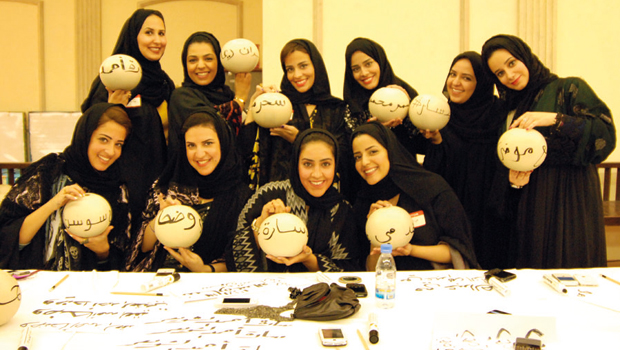Manal Al Dowayan is one of them. Globally recognized, she is a prolific multi-media artist. Originally from the Eastern Province, Al Dowayan’s art, ranging from photography to installation and sculpture, has often touched on the crucial topic of gender-specific social obstacles in her home country. Her latest project, “My Name Is,” touches on a quieter cultural norm: the idea that uttering a woman’s name out loud is offensive.
“If I were to walk into any boys’ school in Saudi Arabia today and ask one of the students: ‘What is your name?’ He would answer the question with confidence. Should I ask: ‘What is your father’s name?’ He would again easily answer. However, should I ask: ‘What is your mother’s name?’ He would hesitate and become nervous and will decide not to give me an answer in an attempt to hide his mother’s name from his schoolmates.’”
This is the anecdote that is the basis of Al Dowayan’s project. Because of the communal contagion of this unspoken culture, Al Dowayan thought it important to base her new piece on a participatory practice. In that, the process of the work became just as valuable as the end result. Having run three workshops during December, in Alkhobar, Riyadh and Jeddah, Al Dowayan met with over 300 women who wrote their names on the large sized beads that ultimately make up the piece. The women included career women, award winning scientists, artists, mothers and grandmothers.
“The baby girls had their names written by their fathers,” Al Dowayan told Arab News. “There was a sense of euphoria and joy among the participating women to be able to have a voice on this subject and to have a gathering of this many women who are in total agreement. It was an experience many women in Saudi Arabia, including myself, have never had.”
In this sense of unity, the women created a statement: “Our names will be preserved and we will not allow the Saudi woman’s name to be erased, replaced, nor become a source of shame.”
The idea itself came about during her pilgrimage to Hajj where she discussed, with other women in the camp, topics relevant to gender issues in the Kingdom. “These discussions inspired me to work on the subject of women’s names becoming a social taboo.”
Having sprouted in a spiritual setting, Al Dowayan didn’t look past deeply traditional and religious elements as being the basis of this culture. But on the contrary, what Al Dowayan found was empowerment to a woman’s name. As noted in her artist statement: “A wonderful hadith illustrates this concept; Amr ibn Al A’as said: The Prophet (PBUH) was asked (“Oh Prophet of God, who is the most beloved to you?” He said: “Aisha”). The prophet pronounced his wife’s name with no shame. Historically, the “mothers of Islam” names were always known and quoted and spoken about. There are lessons to be learned from this hadith. Following in the Prophets example, Saudi Arabia’s founding father, King Abdul Aziz, would take great pride in his sister’s name, Princess Noura. Especially when caught in tense situations he would shout: “And I am the brother of Noura!” and he was a true tribal man.”
In bringing these 300 names to the public, Al Dowayan has presented a multi-layered project that brings women’s roles in society together. She has inadvertently surfaced the strong sense of community and work ethic of women in Saudi Arabia. And they range, from the city women who volunteered for the workshops, took part in discussions and put their names on the beads to the Bedouin women who Al Dowayan involved in the project to make the ‘Sadu’ that will act as the rope stringing the beads together. “I make a call for support and women donate their time and energy to help me. Its no wonder the women of Saudi Arabia are my source of inspiration,” she says.
In the past, Al Dowayan’s projects allowed her to express other concerns relating to her own role as a woman in Saudi Arabia. In 2009, she created a portrait series specifically addressing subjects like employment, driving and voting. The aim was to “highlight that Saudi women are not secondary citizens and can actively participate in building their society and make decisions,” she stresses. Last year, Al Dowayan experimented with her first participatory lead project entitled “Suspended Together,” which reflected on the issue of travel and movement for Saudi women. It was displayed at the 2011 Venice Biennale as part of the pan-Arab exhibition, “Future of a Promise.”
“My Name Is” will be displayed at Edge of Arabia’s first, grand, home-based exhibition. Entitled “We Need to Talk,” the exhibition will open at Jeddah’s Al Furusia Marina on Jan. 19. Al Dowayan’s project will then travel independently to various cities.










